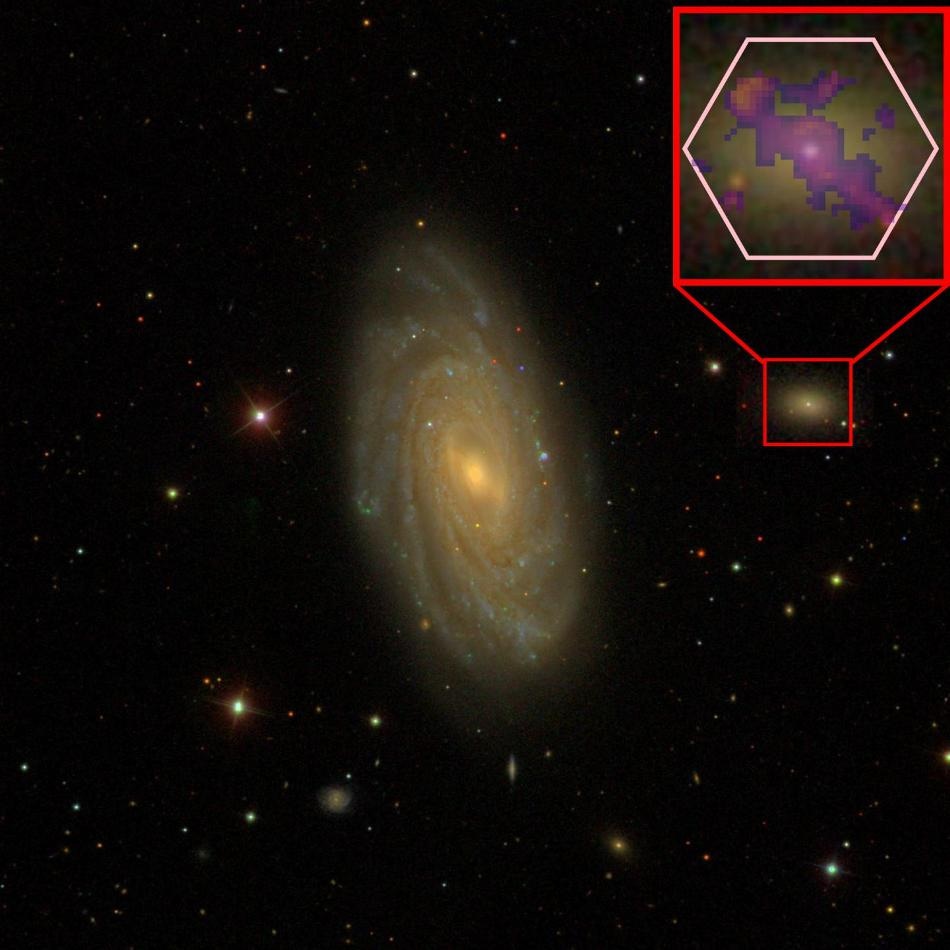Jan 11 2018
Scientists have succeeded in solving a cosmic mystery, by discovering evidence that supermassive black holes prevent the formation of stars in some smaller galaxies.
 Size comparison of a dwarf galaxy with a larger galaxy in the center. Top inset: Dwarf galaxy overlain with some of the MaNGA data, revealing the winds from the supermassive black hole. (Photo credit: Samantha Penny, Institute of Cosmology and Gravitation, University of Portsmouth / SDSS collaboration)
Size comparison of a dwarf galaxy with a larger galaxy in the center. Top inset: Dwarf galaxy overlain with some of the MaNGA data, revealing the winds from the supermassive black hole. (Photo credit: Samantha Penny, Institute of Cosmology and Gravitation, University of Portsmouth / SDSS collaboration)
These giant black holes, more than a million times more massive than the sun, are located in the center of galaxies giving away powerful winds capable of quenching the star-making process. Astronomers earlier believed that they had no impact on the formation of stars in dwarf galaxies. However, their role in the process has been established by a new study from the University of Portsmouth.
The results, presented on Jan 9th 2017, at a meeting of the American Astronomical Society, are considered to be very important: dwarf galaxies (those containing up to100 million to several billion stars) are far more common than bigger systems and what takes place in them is expected to provide a more typical picture of the evolution of galaxies.
"Dwarf galaxies outnumber larger galaxies like the Milky Way 50 to one," says lead researcher Dr Samantha Penny, of the University's Institute of Cosmology and Gravitation. "So if we want to tell the full story of galaxies, we need to understand how dwarf systems work."
In any galaxy, stars are born when clouds of gas fall under the force of their own gravity. But stars are not always born - at some particular point, star formation in a galaxy actually shuts off. The reason for this varies in each galaxy but sometimes a supermassive black hole is considered to be the culprit.
Supermassive black holes are capable of regulating their host galaxy's potential to produce new stars via a heating process. The black hole drives energy via powerful winds. When this wind falls on the giant molecular clouds in which stars would develop, it heats the gas, thus averting its collapse into new stars.
Earlier research has demonstrated that this process will be able to prevent formation of stars in bigger galaxies made up of hundreds of billions of stars - but it was assumed that a different process could indeed be responsible for dwarf galaxies that stop producing stars. Scientists previously thought that the bigger galaxies could have been gravitationally interacting with the dwarf systems, thus pulling the star-making gas away.
However, data proved to the researchers that the dwarf galaxies under observation were continuing to accumulate gas which must re-start star formation in a red, dead galaxy but instead failed to do it. This indeed led the team to the supermassive black hole discovery.
Our results are important for astronomy because they potentially impact how we understand galaxy evolution. Supermassive black holes weren't thought to influence dwarf systems but we've shown that isn't the case. This may well have a big influence on future research as simulations of galaxy formation don't usually include the heating effect of supermassive black holes in low-mass galaxies, including the dwarf systems we have examined in this work.
Dr Samantha Penny, Lead Researcher
The team of international scientists used data from the Sloan Digital Sky Survey (SDSS), which has a telescope located in New Mexico, in order to make their observations. With the help of SDSS's Mapping Nearby Galaxies at Apache Point Observatory (MaNGA) survey, they succeeded in mapping the processes acting on the dwarf galaxies via the star systems' heated gas, which could be detected. The heated gas exposed the existence of a central supermassive black hole, or active galactic nucleus (AGN), and via MaNGA the team also observed the outcome the AGN had on their host dwarf galaxies.